Arts
Let the music go on
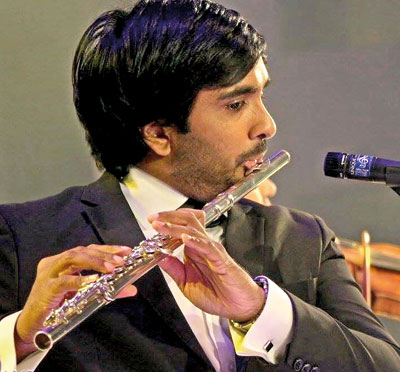
Thilanka Jayamanne.
Pic by Clarity Lawrence
Perhaps nothing is as exhilarating to a musician as performing to an audience that connects with you. COVID-19 lockdowns and the ban on public gatherings put paid to the live show. With doubts over their public shows in the near future, Lankan musicians from different areas in the industry are figuring out ways to keep their passion alive, cope with the financial difficulties and see a glimmer of hope in the future.
For full-time musician Lasith Fernando it was a message from a fan that offered that hope. She told him one of his songs had helped her deal with a terrible anxiety attack during the lockdown. Hearing that his music had made a difference in someone’s life, he describes, as the best feeling in the world. “I would willingly go broke and live out of a van if making music can help me do that for people.”
Since the imposition of curfew came suddenly, Lasith felt he was losing his mind at the start, beset by worry about how he would survive financially. But he soon realized this was also a chance for him to work on himself and his craft.
Over the past few weeks, he has hosted live streamed shows on his Instagram page (@lasith.fernando). His aim was to share his music and positive vibes with people. He has also been writing music, and is planning to start recording soon. “This might be tough though with the current financial situation all of us musicians are facing,” he adds.
In the long term, he confesses he has no idea as to what the new normal in the live music industry would be. Though he feels that most musicians around the world will be out of work for a while, he believes that the way forward is to get creative in tackling this situation. Virtual shows, for example, would be an avenue of sharing art and performance, he feels.
Before the coronavirus hit, singer/songwriter Minesh Dissanayake who has been performing for the past six years would have weekly gigs at different venues in Colombo, as well as at restaurants in the south.
However, the current situation has heavily impacted his bookings. Though not badly affected financially since music is his part-time job, he knows of many musicians who have been hard hit by the sudden loss of income.
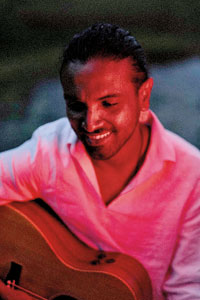
Lasith Fernando. Pic by Ruvin de Silva
On the bright side, Minesh says the curfew gave him more time to create music and find new avenues to share it. He cannot wait to get back in the studio with friends and start recording his new material soon.
Hosting a few live sessions on his Instagram page (@mineshd) the feedback from his fans, that the sessions helped them get through their days in lockdown made him glad he could play a small part in reaching out to people with his music.
Nishantha Warnakulasuriya, also a full-time musician, found it strange to be under lockdown. However, he gradually realised that it gave him plenty of time to explore new areas of his work.
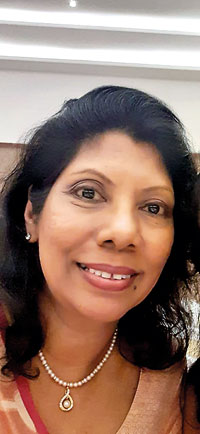
Menaka de Fonseka Sahabandu
His performing, directing and choral music has been put on pause but he pursues his teaching online – a new experience for him.
Collaborating with his friends to release music videos online, he says that though this could never match the intensity of a live performance, it is still an avenue to experience good music.
Nishantha believes that virtual concerts and online streaming are the new normal and would continue for some time. “This is a new experience, a challenging one that most artists need to deal with for the greater good! All these efforts would definitely reap benefits at some point,” he says.
When the curfew first took effect, veteran classical musician and choral director Menaka de Fonseka Sahabandu, was happy that she had a lot of time on her hands – she got the chance to practise, something she could not find the time to do before.
Once she realised that the lockdown would continue, Menaka decided to conduct a few lessons online through Zoom, Skype and WhatsApp video, a new experience for her. Needless to say, she still prefers classes in person.
Online classes can be a lot of work and also tiring for both teacher and student. The other drawback is that Internet connections are often unsatisfactory and could also be expensive.
Prior to the curfews, Menaka was to stage a concert “Rustle of Spring”with the Menaka Singers and her piano students. Though, this had to be postponed, she still hopes to put on the show once it’s safe.
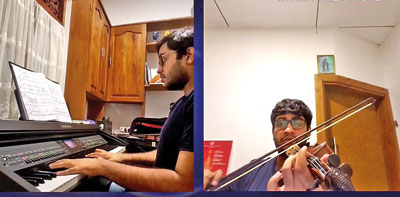
A still from one of Nishantha Warnakulasuriya’s stay at home videos
As a performer herself, Menaka is not a fan of virtual concerts because she feels it is important to have an audience in front of you. She is thinking of staging a few exciting programmes with her pianists and singers next year.
As normal life begins to resume slowly, opera singer Barbara Segal talks of the challenges a post COVID-19 world would bring.
An internationally known opera singer and music lecturer who teaches in several languages, Barbara found herself having to adapt to the lockdown situation. Online lessons were almost impossible because of the poor internet connections and the inability to connect with students.
Well known in the industry for the many classical concerts she presented that featured internationally acclaimed opera stars, she says that even though most of these performers had performed free, the costs of air fares and accommodation had to be sourced. Obtaining sponsorships in the future will be affected, owing to the current economic situation.
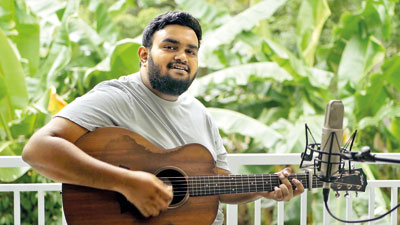
Minesh Dissanayake
Founder director of Sound Scope Thilanka Jayamanne, says their outfit was hit pretty badly as all their concerts, music videos and partnerships had to be put on hold. However, he is hopeful of a better tomorrow.
At present, he and his team are making every effort to keep the brand going and have also released a few previously shot music videos.
They also aim to do something positive by organising a fundraiser for those who were/are struggling with no income due to the pandemic.
To put things in motion, they created a remotely shot music video that featured 16 professional musicians. The project is aimed at promoting charitable organisations (LEADS & Sri Lanka Unites) to which the public can donate to. The video can be accessed on- https://www.facebook.com/soundscope.lk/videos/270358414098115/
In the long run, Thilanka believes the entertainment industry needs to ride out the storm and support each other. “Musicians are reliant on sound equipment suppliers, venues and vice versa. All of us need to realise that if one succeeds, the other does as well.”
And though profits may be slim in the near future, Thilanka is hopeful that things can only get better. “As a musician – you can always promote your brand – so release music videos when possible – stay relevant – and entertain. If you work hard enough, work will come.”
The message remains clear. Life in general will not be the same post COVID-19. However, the lockdown taught many of these musicians to rethink many apects relating to their lives and work. As Lasith puts it, the “tough times don’t last, but tough people do.” And humanity has gone through tougher times in history. But, if we are able to face them with kindness, unity and a reflection on how we should change our ways, there’s a chance of building much better world, they feel.


